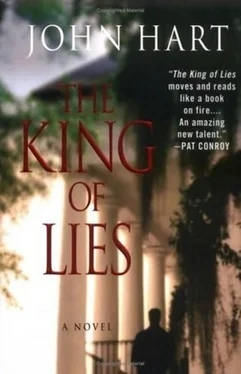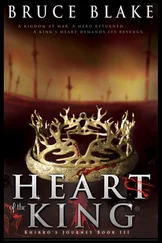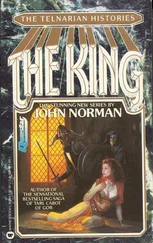I almost believed it.
“Are you through?” I asked, leaning against the back of my seat. My voice was quiet, and I knew that the sound of it made Mills’s histrionics seem extreme. She was on her feet, leaning over the table. She studied my face and straightened. “May I pick this up?” I asked, indicating my father’s will.
Mills nodded, took a step back, and sat down. Much of the color had faded from her face. “As long as you’re still planning to talk to me,” she said.
I declined to answer. I lifted the document from the table and slowly flipped through the pages. I needed something. Anything.
I found what I was looking for on the signature page.
“This is a copy,” I said, laying the document back down and squaring the edges.
“So?” I saw brief concern tighten her eyes. It showed in her voice, too.
“So there are only a few originals of any will. Usually the client keeps one, as does the drafting attorney. Two originals, then. Maybe three. But copies, by their very nature, can be limitless in their number.”
“That’s irrelevant. All that matters is that you knew the terms of the will.”
Arguing with me was her first real mistake. She’d opened the door, given me license to speculate, and it was my turn to lean forward. I wanted my next words on the transcript; I spoke clearly.
“You acquired a copy of the will from Clarence Hambly. You did so prior to the search of my home. That’s one person that we know of who had a copy-you. I can also assume that you gave a copy to the district attorney. That’s two. Clarence Hambly, of course, had one of the originals, so he could also have made a copy. That makes three people with copies of the will who have also been inside my home within the past few days.” I counted on my fingers, bending each one back as I spoke. “Hambly was at Ezra’s wake the night after his body was discovered. That’s one. The district attorney stopped by the other day to speak with my wife. He made a special trip to visit her at the house. Nowhere else. The house. That’s two. And you were there during the search. That makes three. Any one of you could have planted that copy.”
“Are you challenging my integrity?” Mills demanded. “Or that of the district attorney?” I saw that the color was back in her cheeks. My words had hit the mark. She was getting angry.
“You’re challenging mine. So why not? Three people, all of whom had a copy of the will, all of whom have been in my house within the past several days. That’s a compelling problem for you, Detective Mills. People love a good conspiracy theory. And let’s not forget Hambly’s office staff. He has fifteen support people working there, plus another five lawyers. Any one of them could have copied that document. Have you checked them out? I bet a hundred bucks could buy a copy of a dead man’s will, if you found the right person. What’s the harm in that, right? Barbara and I have had countless people in our house over the past year and a half. One of them buys a copy of the will and plants it in our house. That’s a simple picture. You should check them out as well.”
Mills was furious, which was how I wanted her. Her voice rose as she spoke. “You can twist this all you want, but no jury will buy it. Juries trust cops, trust the district attorney. The will was in your house. You knew about the fifteen million.”
“I wouldn’t be so quick to insult the juries of this county. They’re smarter than you think. They may surprise you.”
Mills saw the danger of letting me take control just as I smiled. I was calm. She was not. She had called the jury stupid. I had paid them a sincere compliment. It was on the record.
“This line of questioning is over,” Mills said. Her eyes burned with conviction, and I saw real hatred there.
I wasn’t ready to let it go. Not yet. I wanted one more theory on the record. “Then there’s the person that broke into Ezra’s office,” I said. “The one who tried to kill me with the chair. I wonder what he was after. Maybe he stole a copy of the will.”
“That is enough.” Mills was back on her feet, her hands clamped on the table’s edge. I would get nothing further from her; that was plain.
So I said the only thing left to say.
“Very well. I withdraw my Miranda waiver and assert my right to remain silent. This interview is over.”
Mills swelled as blood suffused her face. She had tasted the kill and liked it; but then I’d shut her down, blown massive holes in her theory. It would not be enough by itself-I knew that-but it made her look bad, cast some small shadow of doubt. She’d not fully considered the significance of the will being a copy. An original would have been much more damning. But it was all smoke and mirrors in the end. She had what she wanted. I was on record. I’d never seen the will, yet it was found in my house.
And fifteen million dollars-that would sway most juries.
Yet as Mills stormed out and left me alone with these thoughts, I had to deal with two more questions that, in their own way, were even more troubling: Why did my father want to cut me out of the will, and why hadn’t Hambly told me about it?
I rubbed my hands across a face that felt as if it belonged to another man. Razor stubble, deep lines-I ground my palms into raw eyes, opened them when I heard Detective Small Head approach the table. He dropped a telephone onto the surface.
“One phone call, counselor. Better make it a good one.”
“How about some privacy?” I asked.
“No chance,” he replied, and moved back to lean against the wall.
Already the interview was moving behind me. I looked at the telephone and remembered Vanessa’s face as she’d fled the sound of Barbara’s voice. I had one phone call, so I thought of all the lawyers I knew, then dialed the only number that made any sense whatsoever. I heard the phone ring at Stolen Farm and squeezed the receiver so tightly that my hand ached. Was I looking for my alibi? Maybe, for a moment, but most of all I wanted her to know that I’d not abandoned her. Please, I begged silently. Please pick up. But she didn’t, just her voice, indifferent, asking that the caller leave a message. But I couldn’t. What could I say? So I lowered the phone back to its cradle, dimly aware of the detective’s curious stare, and the fact that, far from here, an unfeeling machine carried the sound of my anguished breath.
In my imagination, the cells were always cold, but the cell they took me to was hot. That’s the first thing I noticed; after that, it was the size. Narrow and mean, eight by six, with a small window where I’d always pictured bars. But the glass had wires in it. I noticed this as I pressed my face against the window, trying to see more of this place to which Mills had sent me. I’d not seen her after she stormed off, but she didn’t leave me alone for long. Detective Small Head and two uniformed officers had cuffed me again and led me through a warren of hallways to the heavy steel door that guarded the entrance to the police station’s parking garage. Then into a cruiser for the short ride to the county jail, where I was processed.
That part was worse than I’d ever imagined. They took my name, took my clothes, and with a flashlight and a rubber glove, they took the last pitiful rag of my dignity. Detective Small Head watched, and lit a cigarette when they spread my cheeks.
Eventually, someone tossed me an orange jumpsuit and I put it on, ashamed of my eagerness. The legs were too short, and the crotch drooped almost to my knees. My heels hung off the back of the flip-flops, but I stood as straight as I could. Detective Small Head smiled as he said, “Sleep well, counselor.” Then he was gone, and I was alone with the guards, who contrived to act as if they’d never seen me before, instead of two or three times a week for the past ten years.
Читать дальше












